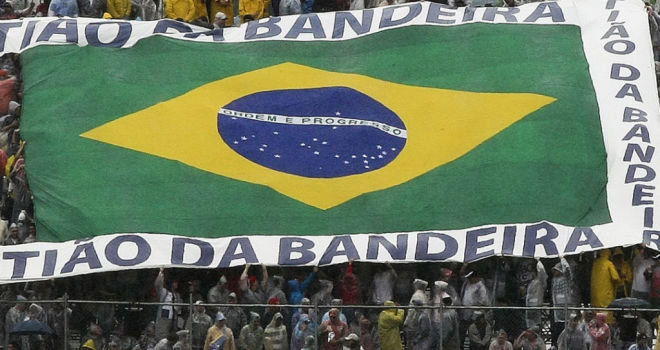

Motor racing in Brazil started before World War II in 1934, but the Brazilian Grand Prix was officially added to the Formula 1 calendar in 1973. The race was won by the native Emerson Fittipaldi in São Paulo at the Interlagos circuit. He won again the next year in wet conditions. In 1975, Carlos Pace won the race in his Brabham who was also a native of São Paulo, followed by Fittipaldi winning in 1976. In 1977, Reutemann won the race but drivers started complaining about the rough and abrasive surface of the Interlagos circuit. The event was transferred to the new Jacarepaguá circuit in Rio de Janeiro.
Watch What’s Trending Now!
After the race in Rio, the race returned to Interlagos in 1979. With the ever increasing population of São Paulo, the increasing slums in the surrounding area did not go with the glamour that Formula 1 brought. Also, the bumpy nature of the track meant that safety concerns were still there even after the track’s renovation. With the glamorous image of Formula 1 being more suited to the rich and wealthy people of Rio, the race went back to the Jacarepaguá circuit in 1981.
In 1981, Alan Jones won the race after Carlos Ruetemann disobeyed team orders and let his teammate, Jones, past. But post-race scrutineering revealed that both Alan Jones and Keke Rosberg who finished second were underweight and the race victory was eventually given to 3rd placed Alain Prost. Prost also won in 1984, 1985, 1987 and 1988 and earned him the nickname of “The King of Rio”. The years 1983 and 1986 saw Nelson Piquet win and the last race in Rio in 1989 saw Nigel Mansell win in his Ferrari. Its was the first time a car won with a semi-automatic gearbox in Formula 1.
ADVERTISEMENT
The Brazilian Grand Prix returned to the Interlagos circuit in 1990 after the circuit was revamped in a $ 15 million investment to smoothen the circuit and shorten it. Alain Prost won the race in 1990, his 40th career win (the most ever at that point of time). 1991 saw the home favorite Senna win emotionally his first Brazilian Grand Prix. His Mclaren had a problem with the gear box leaving him with only the 6th gear to drive in and he had to hold off Williams driver Riccardo Patrese to win. The race was so physically demanding that Senna had to be extricated from his car.
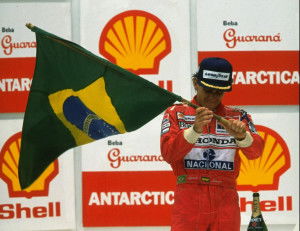
Imago
Ayrton Senna after his first home win at the 1991 Brazilian Grand Prix.
1993 saw Senna win after Prost had to retire from the race after having an accident on the main straight. In 1994, Michael Schumacher won the race. Senna who was five seconds behind Schumacher lost control of his Williams and had to retire from the race. Senna later lost his life in an accident at the San Marino Grand Prix later in the year.
ADVERTISEMENT
1995 saw Michael Schumacher win. Controversially, Briton David Coulthard’s car was excluded from the race but later reinstated for apparently using illegal fuel during the race. Damon hill won in 1996, one of the eight races he would go on to win that season. In 1997, the race was stopped at the start after an accident occurred involving four cars including the car of Gilles Villeneuve. He later jumped in a spare car and went on to win the race.
Mika Hakkinen won in 1998 and in 1999, the former in controversial circumstances. Michael Schumacher won in 2000 and 2002 while David Coulthard won in 2001, a race in which brothers Michael and Ralf Schumacher shared the same row on the grid for the first time.
ADVERTISEMENT
Top Stories
Patrick Mahomes’ Dad Faces 10-Year Prison Sentence After Chiefs QB’s Father Reportedly Violated Probation Terms

PGA Tour Split Into Two as Scottie Scheffler Confirms Stance on Patrick Reed’s Return
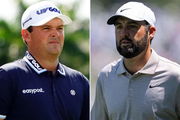
Multiple PGA Tour Pros Stopped from Playing as WM Phoenix Open Round Is Canceled Over Recurring Problem
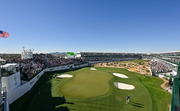
Scottie Scheffler Faces Scrutiny After Taking Out Anger on Golf Club at WM Phoenix Open: ‘Washed’
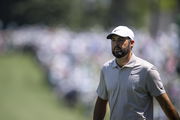
“Stay Right There on the Bench”: LSU’s Grace Knox Faces Backlash After Heated Moment in 64-77 Loss vs Texas
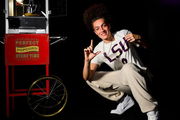
Justin Jefferson Makes Final Decision on Joining Buffalo Bills After Further Damaging J.J. McCarthy Relationship
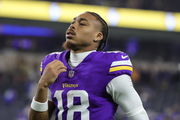
The 2003 Brazilian Grand Prix was one of the most exciting and confusing races. With heavy rainfall and crashing cars, the race was suspended and Kimi Räikkönen was announced the winner under the count back rule, in which the race result is taken from 2 laps prior to the race being stopped. The decision was overturned by the FIA Court of Appeal in Paris after new evidence was found which showed that Fisichella had crossed the line for a second time before Alonso’s accident which stopped the race.
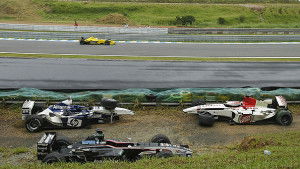
Getty
Fisichella follows the safety car through the crash debris at Interlagos in 2003. Credits – Getty
After 2004, the Brazilian Grand Prix was shifted towards the end of the calendar and in 2005, Fernando Alonso became the youngest world champion at the time, at the Brazilian Grand Prix after finishing third. For 2006, it was made into the prestigious final race of the season which witnessed the retirement of Michael Schumacher before he returned in 2010. The 2007 race was won by Kimi Räikkönen and in 2008, Hamilton secured the fifth position at the last corner of the last lap to take the driver’s championship. His title rival Massa won the race but finished second in the title race. Mark Webber won the race in 2009 and 2011 while then teammate Sebastian Vettel won in 2010 and 2013. The exciting 2012 race was won by Jenson Button which also saw Sebastian Vettel take his 3rd consecutive world title, winning it by three points after finishing 6th after title rival Alonso finished 3rd. It was also the last race for Michael Schumacher who took his second retirement from Formula 1 in 2012. The 2014 race was won by Nico Rosberg, a race which had only 18 drivers starting on the grid, a low number compared to the previous seasons.
ADVERTISEMENT
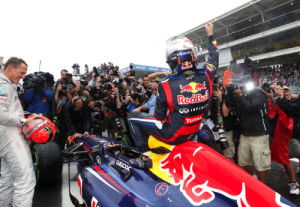
Imago
Sebastian Vettel celebrating after winning the driver’s title at the 2012 Brazilian GP. Credits – Active Pictures.
On 10th of October in 2013, it was announced that the contract for the Brazilian Grand Prix had been extended up until 2022.
ADVERTISEMENT
ADVERTISEMENT
ADVERTISEMENT